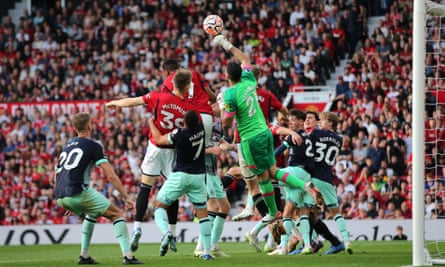Eight years ago a triumphant Richard Scudamore revelled in a record £5.14bn haul from the sale of Premier League TV rights, after a second consecutive high-stakes auction where eye-watering bidding fuelled another 70% increase in value.
“I continue to be surprised by every television deal,” said the then chief executive of the body that runs and monetises the UK’s crown jewel sports rights.
Since then, surprises have been in short supply, with the world’s richest football league unable to engineer another increase as the football TV rights market has flatlined – at best – with the current Premier League deal almost £400m down on that peak.
This week the Premier League sent out its invitation to tender for the UK rights from 2026, with bids due by the end of next month and a result due before the end of the year, but its chief executive, Richard Masters, won’t be expecting a bumper financial gift this Christmas.
The days of no-holds-barred bidding battles are long gone with BT’s effective exit (after the merger of BT Sport with the Eurosport owner Warner Bros Discovery’s operation in the joint venture TNT Sports) and a cosy content sharing deal with former arch-rival Sky, so customers of both broadcasters continue to get all games.

“This is a big moment for us,” says Marc Allera, BT’s consumer chief and the chair of the TNT Sports joint venture. “We have got 95% of the Champions League and Europa League secured for the next four years. It complements our broader portfolio; the Premier League is the last remaining piece of the jigsaw. But the market is not in an inflationary stage at the moment.”
Across the Channel, national domestic leagues are suffering from actual or real-terms declines in the value of their sports rights.
Earlier this week, France’s Ligue 1 failed to receive a bid for any of its five TV packages at the target price.
In Italy, the process to award Serie A rights has been rumbling on since the summer, with Leonard Blavatnik’s sports streaming platform Dazn and Sky Italia, owned by the US TV company Comcast, offering bids short of the $1bn-plus goal.
Germany’s Bundesliga rights are due to go to auction early next year, having only managed to achieve a flat deal at the last negotiations in 2021.

Spain’s La Liga, Europe’s second most valuable league for rights after the Premier League, completed a flat deal in 2021 and is not due for renewal until 2028.
“There just isn’t the same competitive dynamic now, it is not cooperation as such, but the risk and jeopardy of not winning packages is much less,” says Gavin Patterson, the former chief executive of BT, who led the telecoms group’s blockbuster bidding strategy against Sky in the last decade. “I think from a Premier League perspective the goal is not to seek a bidding war but to engineer the auction in a way to increase the headline figure after having to roll over the deal last time.”
After renewing a flat deal in 2021 – having been forced to return to the market to resell a package for the first time ever in the previous auction, which led to Amazon making a cut-price entry into football streaming – the Premier League has engineered an auction to produce a safe win-win.

Up for grabs are five packages of 42 to 65 matches a season, upping the total to a record 270 games in a strategy to which the Premier League had historically been resistant, with the length of the deal stretched from three to four years for the first time.
after newsletter promotion
“This is the easiest bid in the world,” says one sports rights specialist, who has advised a number of bids in the past. “It is slam-dunk bidding because no one needs to go head-to-head in a major way. Everyone knows they will be able to get a decent weekend slot for broadcast and there are far more games up for grabs than were expected.”
Sky, which in May secured a record £935m five-year deal with the English Football League to broadcast 1,000 games a season, is expected to remain the dominant broadcaster.

With the scrapping of the Amazon package, the bargain £90m pack of 20 games streamed over just several days each year, it is highly likely that the US streamer will exit Premier League broadcasting.
“Amazon was clever and opportunistic,” one TV industry source says. “But now they would have to stump up about £750m for the cheapest package; it is a different scenario. And they don’t necessarily need Premier League; they have a match a week of Champions League secured from next year.”
However, at least one new player is expected to enter the market.

YouTube, which recently splashed out billions on US NFL rights, or Apple, which last year struck a record global deal with the US league Major League Soccer, remain long shots – although they cannot be ruled out.
It is widely expected that Dazn, which has a range of sports rights, including football in markets such as Germany and Italy, will enter the fray with a good chance of winning at least one package of games.
“My basic expectation is that there will be some room left for Dazn,” says François Godard, a sports analyst at Enders Analysis. “The only possible speculative outsider I am keeping an eye on would be YouTube. Dazn won’t blow up the auction; they have been highly cautious not to push up prices in country-by-country deals. They are not crazy. From a Premier League perspective, if they can get a modest 5% increase in what they make as a headline figure, even if annually they receive less, that will be a good result.”

